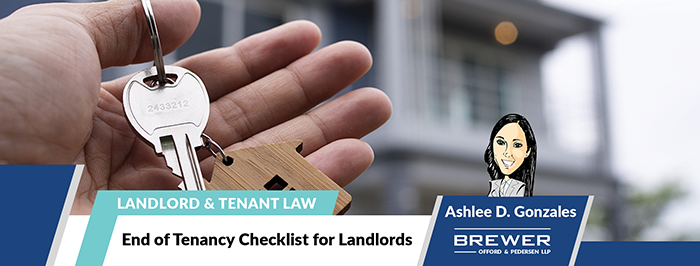“`
At the end of each residential tenancy in California, landlords are required to perform a checklist of tasks to comply with the law. These tasks can be intimidating and are riddled with pitfalls that could result in further involvement with your tenant, including potential dispute. In this article, we will go over some of the most important things to remember to help you avoid a dispute with your soon to be former tenant.
Pre Move-Out Inspection
Any time a tenant’s occupation of a residential unit is coming to an end, the landlord is required to offer a pre move-out inspection related to the tenant’s security deposit. I typically have my landlord clients provide notice three (3) weeks before the anticipated move-out date. Additionally, Civil Code Section 1950.5 requires specific language to be delivered to the tenant relating to the inspection. See below:
“Pursuant to the end of your tenancy coming up on [DATE], we would like to offer you a pre-move out inspection as provided for under Civil Code Section 1950.5(f). The purpose of the inspection shall be to allow you an opportunity to remedy identified deficiencies, in a manner consistent with the rights and obligations of the parties under the rental agreement and civil code, in order to avoid deductions from the security deposit. If you would like to do the inspection, please advise on some dates and times in the immediate future so we can schedule the inspection. Ideally, the sooner the better as it will give you all more time to conduct any necessary repairs before your tenancy ends on [DATE].”
Regarding timing of the inspection, this is what Section 1950.5 says: “at a reasonable time, but no earlier than two weeks before the termination or the end of lease date, the landlord, or an agent of the landlord, shall, upon the request of the tenant, make an initial inspection of the premises prior to any final inspection the landlord makes after the tenant has vacated the premises.”
The tenant has no obligation to conduct a pre move-out inspection, and if they fail to do so, they’ll be unable to cure deficiencies that would otherwise result in deductions from the deposit.
After the inspection, the landlord is required to provide the tenant with an itemized statement of proposed deductions, specifying what repairs and/or cleanings need to be done to avoid such deductions. The statement needs specific language, so please seek legal counsel when drafting these post-inspection itemized statements for the tenant.
Confirm Relinquishment of Possession
Even if a tenant promises to be out by a set date and their move-out is cordial, landlords must be especially careful when regaining possession of the unit. Our firm has litigated disputes wherein a landlord reasonably believed the tenant had vacated, but they had not formally ‘relinquished possession’. In that case, the landlord noticed that the tenant had emptied out the unit and was not present, so they changed the locks and regained possession.
Return of Security Deposit and Itemized Statement
In addition to having to offer the tenant a pre move-out inspection, landlords must also send their tenants an itemized statement and a return of the security deposit within 21 days after the tenants vacate the subject property.
Abandoned Personal Property
Once you’ve done your pre move-out inspection and regained possession, it is not uncommon for tenants to leave items of personal property behind. Either they do so purposefully, they didn’t have enough time to vacate, or they simply just forgot. Regardless, if this occurs, there is a specific procedure that landlords must go through to comply with California law as it relates to abandoned personal property belonging to a tenant. Civil Code Sections 1980 through 1991 discuss how to handle this type of situation.
Conclusion
Not only do property owners and managers have many responsibilities while their tenants reside in their unit(s), but the process of a tenant vacating the unit and what happens after the tenant vacates has many steps…
“`
